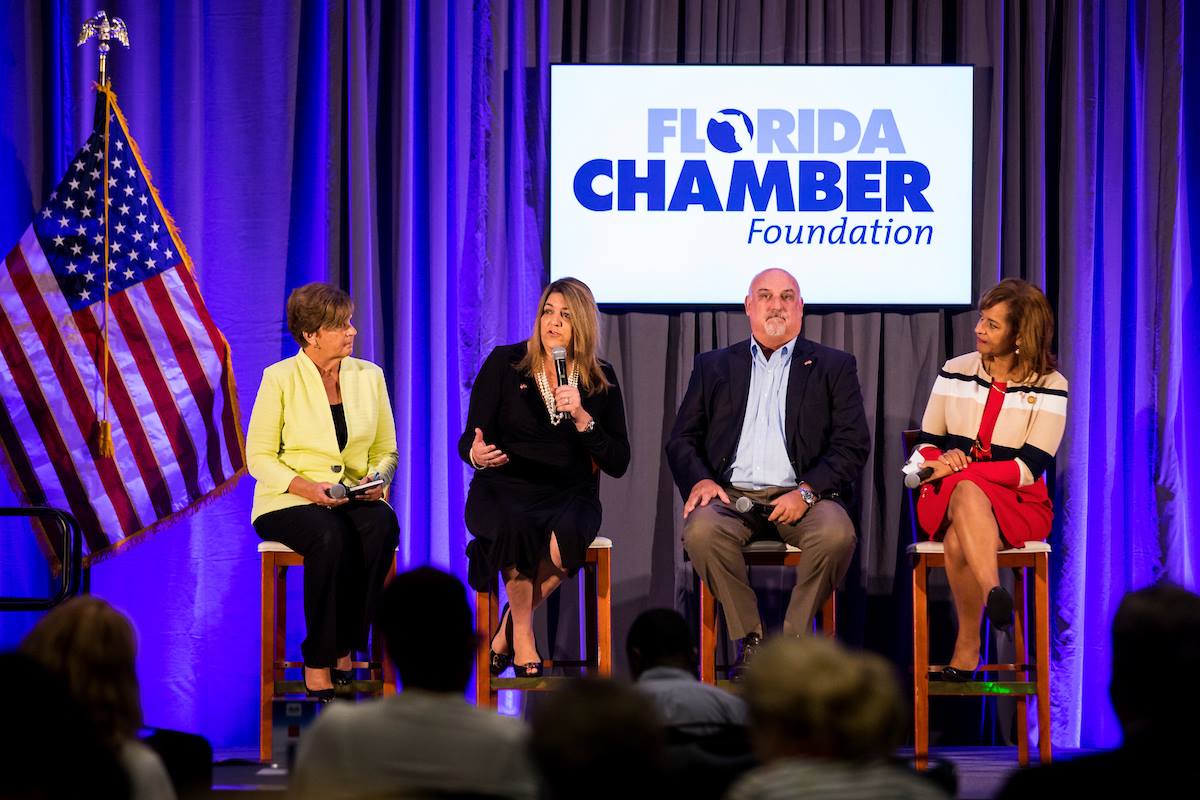
From left, Marlene Spalten, Madeline Pumariega, Mike O’Neill, and Ava Parker take part in “A Conversation With Florida’s State College System: Securing Pathways for Florida’s Future Earners” panel during the 2017 Learners to Earners Education Summit. Photo by Colin Hackley.
The Florida Chamber Foundation’s 2017 Learners to Earners Education Summit recently brought together leaders from the state’s business, education, and workforce development communities to discuss best practices in connecting today’s learners to tomorrow’s career opportunities.
The two-day event — which took place June 13-14 in Orlando — featured a panel titled, “A Conversation with Florida’s State College System: Securing Pathways for Florida’s Future Earners.” Part of the conversation focused on the effect that collective impact and the work of local college access networks (LCANs) can have in shaping the state’s future.
“What’s interesting about the attainment conversation is that education is everybody’s business,” said Ava Parker, president of Palm Beach State College and a member of LCAN Achieve Palm Beach County. “There needed to be a shift in our community to start the conversation and build the expectation that a high school diploma is not enough.”
Parker was part of a panel moderated by Madeline Pumariega, Chancellor of the Florida College System. Other panelists included Mike O’Neill, Site Manager of Pratt & Whitney and Marlene Spalten, President and CEO of Community Foundation of Tampa Bay.
“I want the students to feel it in the air, that high school isn’t enough and you need a plan for more,” Parker said. “It’s like a movement; if we all agree to focus on this, we can make great things happen.”
Palm Beach State College has worked closely with Achieve Palm Beach County, an LCAN that officially launched last year. The school has also partnered with businesses like Pratt & Whitney, an aerospace manufacturer that invested more than $60 million to expand its West Palm Beach facility several years ago.
“In working with Palm Beach State College we were able to shape the curriculum to help students be better prepared for employment,” O’Neill said. “The traditional model believed that higher education provides the foundational skills, and the job-specific skills will be learned in the first two years on the job. We can’t wait that long.”
Spalten described the work of LEAP, the Hillsborough County-based LCAN, and how it has resulted in greater and more thoughtful collaboration and alignment among community leaders.
“It’s not only choosing partners, but choosing specific leaders within those partners who are committed to a collective impact approach to solve such a complex problem,” Spalten said.
Pumariega reiterated the importance of having community leaders who think strategically when they establish partnerships or set goals.
“We don’t want to produce degrees to produce degrees,” Pumariega said. “We want to produce credentials that align to the needs of the workplace in Florida.”
The rest of the summit included various panels and discussions centered on statewide efforts to ensure Florida’s workforce is skilled enough to perform the estimated 2 million net new jobs that the state will need to create by 2030.
Tony Carvajal, executive vice president of the Florida Chamber Foundation, shared thefloridascorecard.org and predicted a systematic shakeup for the state’s future workforce in the near future.
“It’s not our schools that are the issue or caring teachers, it’s a systems issue in how we prepare students for jobs,” Carvajal said. “Disruption is coming.”
